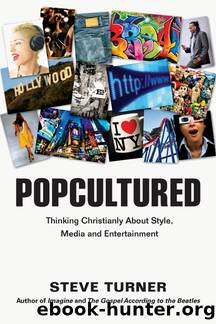Popcultured by Turner Steve;

Author:Turner, Steve;
Language: eng
Format: epub
ISBN: 9780830895489
Publisher: InterVarsity Press
Published: 2013-05-25T00:00:00+00:00
Extravagant Expectations
Two pertinent questions are whether popular culture has become so pervasive that it allows little time for reflection, and whether we are embarked on an increasingly fruitless search for ever-bigger thrills. The comedian Russell Brand comments, âIâve noticed from my participation in popular culture that it functions to prevent synaptic connections happening in our minds so we canât think properly.â3 Daniel Boorstin said that we suffer from extravagant expectations. âWe expect too much of the world,â he wrote in The Image. âOur expectations are extravagant in the precise dictionary sense of the wordââgoing beyond the limits of reason or moderation.â They are excessive.â4
One of the great values of popular culture is that it can help âtake our minds off things.â We need that sort of relief. Any survey carried out to discover what makes a happy marriage will find that âhumorâ rates highly. Why so? What have wisecracks, puns and leg-pulls got to do with marital harmony? The answer is that humor creates a buffer. If marriages consisted only of intense discussions about things that âreally matter,â it would be like two bones engaging each other without the benefit of cartilage. Humor relaxes the facial muscles, lightens the mood, dispels anger and neutralizes conflict. It provides space.
In a similar way what we sometimes call âthe daily grindâ is brightened by entertainment. Seeing a film wonât cure depression but it will give temporary relief and can help put things into perspective. Music wonât reduce the workload but it can make it more enjoyable. There are suggestions in the Bible that music was played during the construction of buildings (2 Chron 34:12-13) and that songs were sung in the vineyards (Is 16:10). When Saul suffered anxiety his first thought was âto search for someone who can play the lyreâ (1 Sam 16:16). This was how David first came into Saulâs life. David took his harp and played. âThen relief would come to Saul; he would feel better, and the evil spirit would leave himâ (1 Sam 16:23).
But when entertainment is used either to evade the questions and problems of life or becomes the central purpose of life, then it is occupying a position for which it was never intended. For many people the reality of life as described by God is regarded as fantasy, and the fantasies of life as concocted by the entertainment industry are regarded as reality. The writer of Ecclesiastes was a wise man who concluded that life was empty, repetitive, fruitless, boring and without meaning. Having exhausted the possibilities held out by reason and knowledge, he sought consolation in the realm of experiences. If he couldnât get answers to questions, maybe he could at least shield himself from the logic of his conclusions. He tried madness, folly, pleasure, intoxication, food, beauty, possessions, music, sex and consumerism, but they only led him back to his original conclusion:
When I surveyed all that my hands had done
and what I had toiled to achieve,
everything was meaningless, a chasing after the wind;
nothing was gained under the sun.
Download
This site does not store any files on its server. We only index and link to content provided by other sites. Please contact the content providers to delete copyright contents if any and email us, we'll remove relevant links or contents immediately.
The 5 Love Languages: The Secret to Love That Lasts by Gary Chapman(9287)
The Space Between by Michelle L. Teichman(6576)
Assassin’s Fate by Robin Hobb(5856)
Wiseguy by Nicholas Pileggi(5320)
Everything Happens for a Reason by Kate Bowler(4479)
Gerald's Game by Stephen King(4377)
Pillow Thoughts by Courtney Peppernell(4018)
A Simplified Life by Emily Ley(3971)
The Power of Positive Thinking by Norman Vincent Peale(3864)
Resisting Happiness by Matthew Kelly(3197)
Girl, Wash Your Face by Rachel Hollis(3126)
Harry Potter and the Prisoner of Azkaban (Book 3) by J. K. Rowling(3113)
Being Aware of Being Aware by Rupert Spira(3086)
Real Sex by Lauren F. Winner(2867)
The Code Book by Simon Singh(2859)
More Language of Letting Go: 366 New Daily Meditations by Melody Beattie(2850)
Name Book, The: Over 10,000 Names--Their Meanings, Origins, and Spiritual Significance by Astoria Dorothy(2840)
The Holy Spirit by Billy Graham(2777)
The Secret Power of Speaking God's Word by Joyce Meyer(2754)
